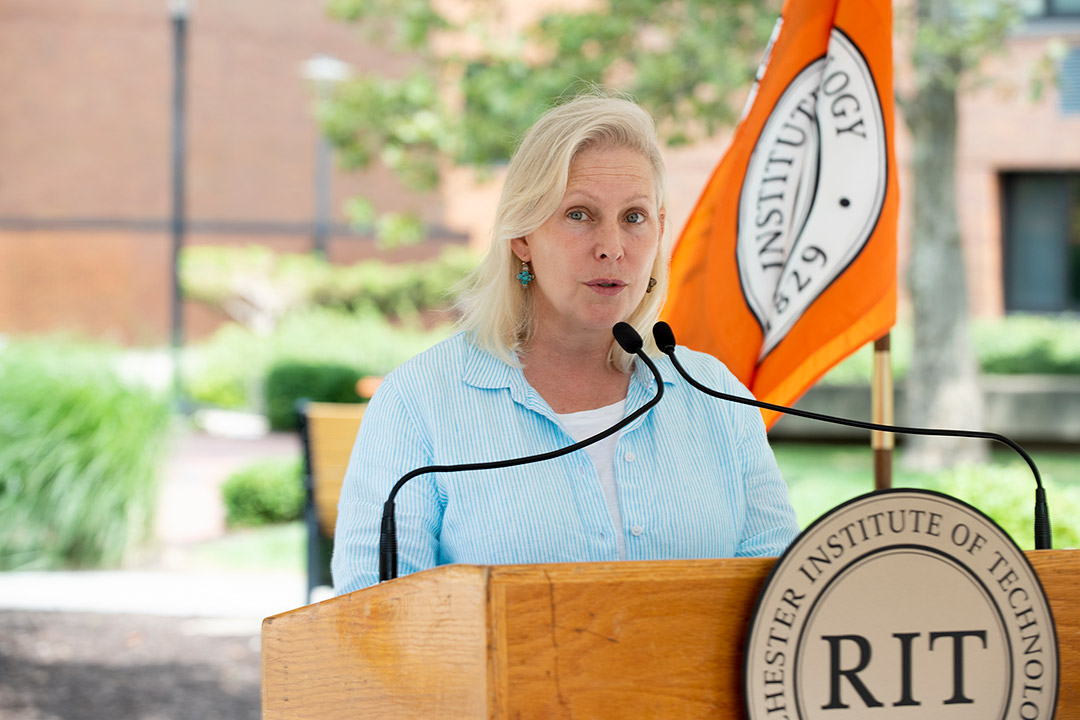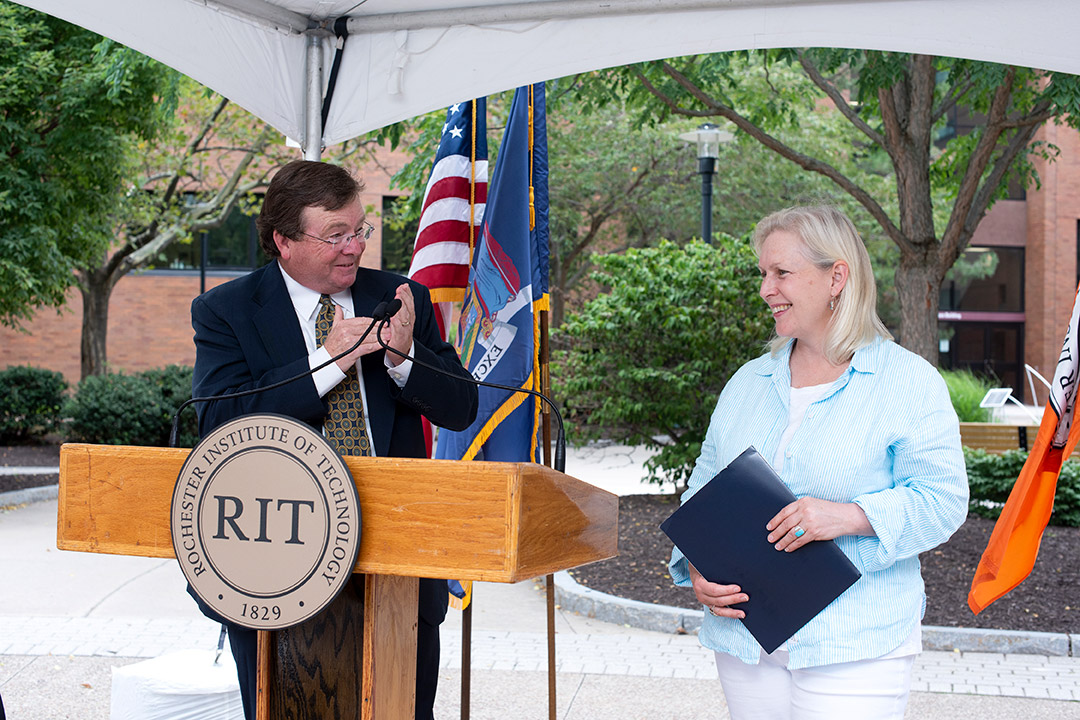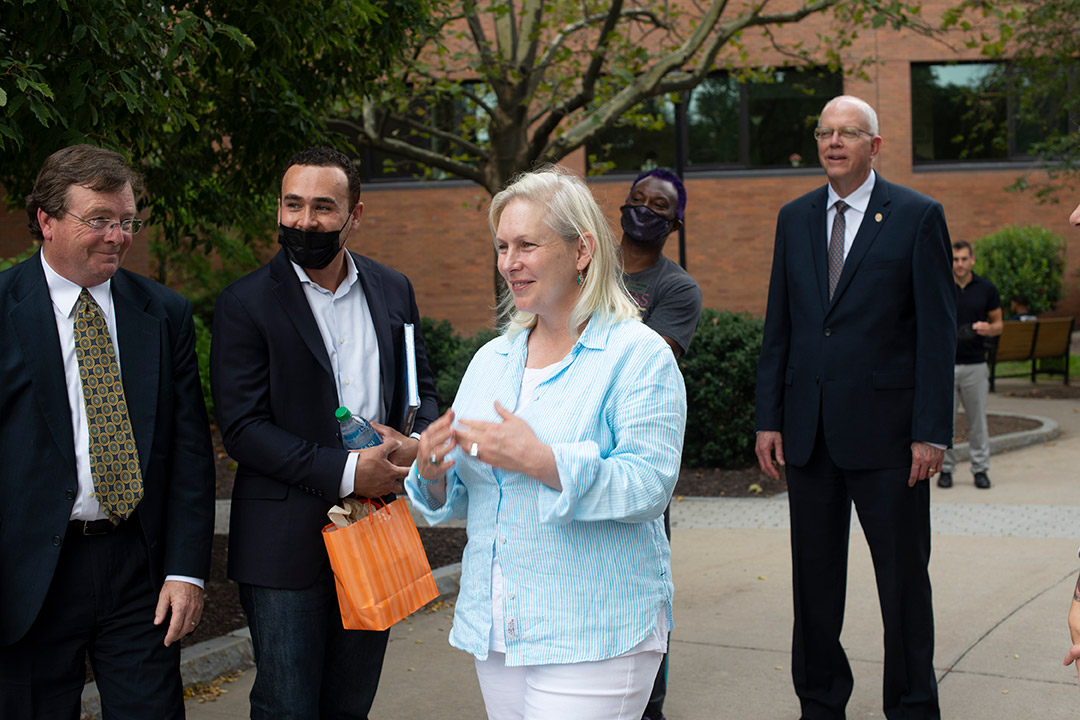U.S. Sen. Kirsten Gillibrand advocates for significant funding increase for NTID in FY2022
Senator announces support for $8.2 million funding increase at Aug. 23 college visit
A. Sue Weisler
U.S. Sen. Kirsten Gillibrand visited NTID Aug. 23 to announce her recommendation for a significant funding increase for the college for Fiscal Year 2022.
Rochester Institute of Technology’s National Technical Institute for Deaf welcomed U.S. Sen. Kirsten Gillibrand to campus Aug. 23 to announce her recommendation for $89.7 million in funding for the college in Fiscal Year 2022, an $8.2 million increase from Fiscal Year 2021.
Gillibrand, who annually advocates for NTID appropriations, joined RIT President David Munson, NTID President Gerard Buckley, and New York State Assemblywoman Sarah Clark campaigning for additional resources to provide deaf and hard-of-hearing students with a college education that gives them the skills needed to excel and advance their careers.
A. Sue Weisler
NTID President Gerard Buckley thanks U.S. Sen. Kirsten Gillibrand for her support during her visit to campus Aug. 23.
“Continuing to provide federal support to NTID is a good investment,” said Gillibrand. “When students can train for and find well-paying jobs, not only do they help our economy grow, but they are also less likely to rely on Supplementary Security Income or social security disability insurance payments. Federal support makes this education accessible across the country and helps NTID meet the evolving needs of its students. I’m proud to lead the fight for federal funding for NTID every single year, and this year is no exception.”
Gillibrand also mentioned that increased funding to the college would help NTID expand the reach of existing programs and start new ones to help deaf and hard-of-hearing students prepare for careers. Additional dollars would help NTID grow regional STEM center programs, establish a national hub of innovation for deaf and hard-of-hearing scientists in Rochester and create more access to careers in science, biomedical research, and health professions. Funding is expected to also help start a computer science and cybersecurity training center for deaf and hard-of-hearing students based at RIT’s Global Cybersecurity Institute.
Munson thanked Gillibrand for her visit.
A. Sue Weisler
U.S. Sen. Kirsten Gillibrand greets RIT administrators, faculty and staff, including RIT President David Munson, back right, and NTID President Gerard Buckley, far left, during her campus visit Aug. 23
“All of us at RIT, and especially those at our National Technical Institute for the Deaf, thank Sen. Gillibrand for taking the time to visit our campus today,” said Munson. “Sen. Gillibrand’s steadfast support of NTID’s mission to educate, train, and employ our deaf and hard-of-hearing community members is greatly appreciated. Funding from our federal government partners helps this gem on our campus shine and provides superior opportunities for our deaf and hard-of-hearing students, faculty, and staff that are simply unmatched. We are all fortunate to be able to benefit from this unique educational and experiential enterprise that enriches our campus community.”
One of nine colleges within RIT, the National Technical Institute for the Deaf was established in 1965. As the first and largest technological college in the world for deaf and hard-of-hearing people, NTID has pioneered and set the standard for postsecondary and technical education for deaf and hard-of-hearing students. The college serves more than 1,100 deaf and hard-of-hearing students from around the United States and the world who live, study, and work alongside hearing students on the mainstream RIT campus. NTID graduates are successful in a broad range of career fields.
“For more than 50 years, NTID has benefitted from a strong partnership with our Senate and Congressional representatives,” said Buckley. “Sen. Gillibrand’s unwavering support and advocacy for NTID’s mission has provided countless opportunities for deaf and hard-of-hearing students to learn and succeed to become the leaders of tomorrow. We are grateful for Sen. Gillibrand’s ongoing advocacy, and her support for NTID’s FY22 request, that will allow us to continue to expand the services we provide to deaf and hard-of-hearing students from across the country.”








